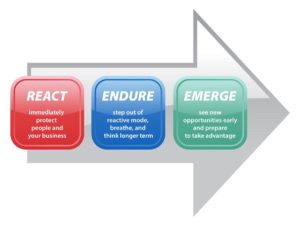 I’m worried sick about some businesses and totally impressed by others that have responded quickly, some brilliantly. The range of problems caused by the coronavirus could not be broader. Just among my own clients and contacts efforts span everything from shifting operations into home offices to establishing iron clad disinfecting and distancing protocols to tracking daily changes in governmental regulations across hundreds of countries to sourcing new materials and retooling machines to creating systems for online ordering and delivery to making momentous workforce decisions to switching from plated meals to take and bake options. All while the world continues to shift under their feet.
I’m worried sick about some businesses and totally impressed by others that have responded quickly, some brilliantly. The range of problems caused by the coronavirus could not be broader. Just among my own clients and contacts efforts span everything from shifting operations into home offices to establishing iron clad disinfecting and distancing protocols to tracking daily changes in governmental regulations across hundreds of countries to sourcing new materials and retooling machines to creating systems for online ordering and delivery to making momentous workforce decisions to switching from plated meals to take and bake options. All while the world continues to shift under their feet.
Given the magnitude and speed of this disaster, scrambling is to be expected. Our brains are firing on all cylinders up to 24 hours a day. We are thinking about a thousand different problems and questions all at once. We can’t run fast enough. Meanwhile, we are downright scared. Scared for our own safety. Scared for our employees. Terrified by the bottom line and the future of the business.
When we think about a thousand concerns at once, we don’t think well. Period. We need to divide and conquer. We need to create clarity.
In a crisis, there are three levels of critical responses. You must: React, Endure, and Emerge. You must consider all three. You must consider them one at a time. And, you can’t ignore any one of them for long. You might be tempted to think of these as phases, but in this crisis, I don’t think you will ever finish one and move on to the next. There is too much uncertainty.
React
As a crisis unfolds, you must react immediately to protect people and your business. At this point, you have probably been reacting for several weeks. Protecting yourself, your employees, and your customers from getting sick, protecting your cash flow, protecting your ability to deliver to customers, and protecting your organization from rapidly changing government orders and regulations. In this crisis, this is not just a phase that ends early. As the number of COVID-19 cases increases, supply chains are disrupted, and regulations change, you will have to continue to react.
Bring some structure to your thinking by building a checklist starting with these high-level questions:
- What does keeping everyone safe right now entail?
- What factors must we consider in order to protect our revenue, minimize unnecessary expenses, and provide reasonable and fair options and compensation for our employees right now?
- What are our immediate risks?
By now, I hope you have such a checklist of issues and risks to reconsider as this crisis continues to grow and morph. If not, it still makes sense to create one because, unfortunately, you will likely have opportunities to use it again. Creating such a checklist might also reveal additional issues you have forgotten to consider. Checklists, by the way, are a way to create clarity and to divide and conquer.
Endure
Distinct from those immediate reactions, you also need to be thinking longer term. How will you endure this crisis? We don’t yet know, and may not know for months, how long it will be before there are reduced restrictions and some movement toward a rebounding economy. To endure successfully, you need to think along new lines with questions such as:
- How can we help alleviate pain during this crisis? Are there opportunities for us to provide value, whether pro bono or for a fee?
- Which of our reactive efforts could benefit from a new approach?
- What scenarios must we prepare for?
- What additional risks might we encounter as this crisis endures and what might we do to mitigate them?
It is never too soon to start this line of thinking, but it requires stepping out of reactive mode and catching your breath. One again, create clarity by dividing and conquering.
Emerge
This crisis will end. The economy will recover. (At least I hope so!) What do you want to be at the end of the crisis? This is a third line of thinking that requires some separation of time and space from the other two lines of questioning.
- How is the world changing?
- What are we learning about our organization? Our ability to work remotely? To respond quickly? To inspire confidence? To think strategically?
- What scenarios should we be pondering or planning for?
There will be new opportunities. Guaranteed. We will not return to the old “new normal.” Those who see the opportunities early and prepare will be in the best position to take advantage of the recovery.
Clarity Has Never Been More Important
I know your brain and your conversations have already run through many ideas in each of these three levels. But are you doing it with clarity or in scattered tangents? Are you thinking through your objectives and options or leaping to solutions? If you discuss all three levels in a single conversation, leap from one to another, ignore entire dimensions of each issue, and conflate the objectives, you will create chaos and anxiety, you will never get all the brainpower in the room focused on the same issue, and you will make poor decisions. Clarity has never been more important!
Wondering how to create greater clarity? Read Clarity Crash Course: Creating Clarity in a Business Crisis!


Comments are closed.